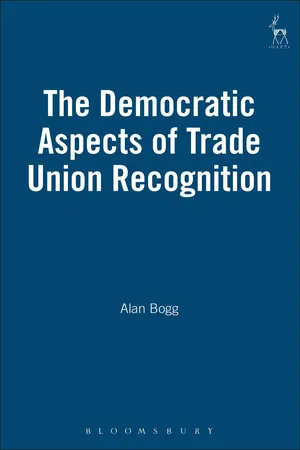
- 336 pages
- English
- PDF
- Available on iOS & Android
The Democratic Aspects of Trade Union Recognition
About This Book
Winner of the SLS Peter Birks Prize for Outstanding Legal Scholarship 2010. The long ascendancy of pluralism and 'collective laissez-faire' as a guiding ideology of British labour law was emphatically shattered by the New Right ideology of Thatcher and Major. When New Labour was finally returned to power in 1997, it did not, however, attempt to resurrect the pre-Thatcher preference for pluralist non-intervention in collective industrial relations. Instead, it purported to follow a 'Third Way'. A centrepiece of this new approach was the statutory recognition provision, introduced in Schedule A1 TULRCA 1992. By breaking with the tradition of voluntarism in respect of recognition of trade unions, New Labour sought to provide a model of collective labour law which combined legal support with control through juridification. A closer study of both the history of approaches to recognition and the current provisions opens up fundamental questions as to the nature of this new model and the ones it aimed to replace. This book uses political philosophy to elucidate the character of those historical approaches and the nature of the 'Third Way' itself in relation to statutory union recognition. In particular, it traces the progressive eclipse of civic republican values in labour law, in preference for a liberal political philosophy. The book articulates and defends a civic republican philosophy in terms of freedom as non-domination, the intrinsic value of democratic participation through deliberative democracy, and community. This can be contrasted with the rights-based individualism and State neutrality characteristic of the liberal approach. Despite the promise of civic community in the 'Third Way' rhetoric, this book demonstrates that the reality of New Labour's experiment in union recognition was an emphatic reassertion of liberalism in the sphere of workers' collective rights. This is the first monograph to offer a sustained critical analysis of legal approaches to trade union recognition. It will be of particular interest to labour lawyers, but also a wider audience of scholars in political philosophy and industrial relations.
Frequently asked questions
Information
Table of contents
- Cover
- Prelims
- Introduction
- Part 1: Historical Perspectives on Union Recognition and the Law
- Part 2: Two Conceptions of the Third Way Labour Law: Liberals and Civic Republicans
- Part 3: Evaluating the Schedule A1 Recognition Procedure
- Index